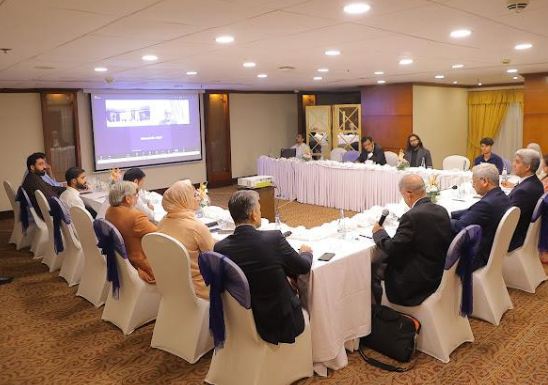DNA
ISLAMABAD, OCT 28: The Islamabad Institute of Conflict Resolution (IICR) hosted an insightful policy roundtable addressing pressing issues in Pakistan’s national security, and regional challenges. Esteemed academics, industry experts, and former military officials delivered talks on diverse, timely topics, providing an opportunity for robust discussion and strategy development. Prof. Dr. Nazir Hussain served as the moderator, guiding a session that underscored the importance of collaborative national resilience in the face of multifaceted security threats.
Dr. Khalid Chohan, DG Research NACTA spoke on terrorism, radicalism, and insurgency, particularly focusing on the complexities of the Tehrik-i-Taliban Pakistan (TTP). He highlighted that the TTP, despite its attempts at influence, lacks local support in Khyber Pakhtunkhwa (KPK). Dr. Chohan explored the internal tribal dynamics within the TTP, especially rifts influenced by the Mehsud tribe, and the role of online forums in spreading extremist ideologies. He emphasized Pakistan’s need for innovative policy measures with strong implementation to counter growing threats.
Lt Gen Naeem Khalid Lodhi discussed Pakistan’s internal and regional challenges. He advised fostering diplomatic relations with Afghanistan while handling the TTP as a separate concern. Gen. Lodhi warned that strained Pakistan-Afghanistan relations could compromise the war on terrorism. He stressed the importance of introspection within Pakistan’s governance, stating that enhancing quality of life for ordinary citizens is fundamental to true progress. He further urged Pakistan to adopt a forward-looking approach, learning from past experiences and moving away from a “victim mindset.”
Brigadier (R) Imran Malik delivered a compelling analysis on insurgency in Balochistan, pointing to increased threats from groups like BLA/BRAS and the TTP. He presented a potential scenario where these groups could collaborate to incite nationalist, sectarian, and ethnic unrest. Malik recommended a two-pronged strategy: strengthening the government’s media counter-offensive to negate foreign misinformation, and engaging the Baloch populace directly, bypassing feudal intermediaries. His call to action included strategic military preparedness, proactive intelligence, and a comprehensive, government-led approach to engage the educated Baloch middle class, address grievances, and counter external influences.
Dr. Bilal Zubair of the National Defence University spoke on the China-Pakistan Economic Corridor (CPEC), the Shanghai Cooperation Organization (SCO), and foreign policy challenges. He explored “soft power” in national security, urging Pakistan to leverage its cultural assets through public diplomacy, education exchanges, and diaspora engagement. Dr. Zubair highlighted the potential for digital media initiatives like “Digital Pakistan” to enhance the country’s image and promote its interests. He noted the need for a cohesive cultural diplomacy policy to project Pakistan’s unique cultural strengths on the global stage.
Dr. Zunera Jaleel, Chair of Cybersecurity at Air University shared her expertise on Pakistan’s cybersecurity challenges. She identified ransomware, AI-generated threats, and Advanced Persistent Threats (APTs) as critical concerns, stressing the need for cybersecurity awareness and indigenous product development. Dr. Jaleel recommended public-private partnerships, enhanced legislation, and digital forensics to address emerging cyber threats. She underscored the role of educational frameworks to build a cyber-secure workforce, equipped to protect national assets and counteract state-sponsored attacks.
Ms. Farzana Yaqoob argued that the recent elections in Indian Illegally Occupied Jammu & Kashmir (IIOJK) are not reflective of genuine consent to Indian rule, but rather an assertion of resilience under oppression. Ms. Yaqoob reaffirmed that the people of IIOJK remain committed to their struggle for self-determination, condemning ongoing Indian repression.
Conclusion and Future Initiatives
The roundtable underscored the importance of addressing Pakistan’s complex security landscape through comprehensive, multi-faceted approaches. Each speaker highlighted specific challenges while advocating for robust policy measures, strong governance, and proactive engagement with communities. The IICR remains dedicated to fostering dialogue, strategic insights, and collaborative efforts to address the nation’s evolving security dynamics.

















